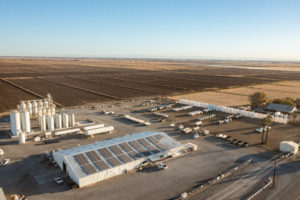Growing Together Fall 2021
Achieving Sustainability with Solar
To increase efficiency and sustainability in its day-to-day operations, Grow West has installed solar panels at four of its facilities. By harvesting Mother Nature’s energy and turning it into electricity, rather than pull it from the electrical grid, the company can reduce its carbon footprint and adhere to its values around environmental and economical sustainability.
“We’ve always strived to implement the most sustainable processes possible,” says Grow West CEO, Ernie Roncoroni. “Whether we are looking for a product that has a smaller environmental impact or a way to better utilize natural resources across the acres we serve, we’re doing these things to be more sustainable and more efficient.”

The process of adding solar panels started with selecting a trusted partner to get the job done. This was important to Grow West because the process can be a long and difficult one. From acquiring the product, following the permit process, scheduling the build outs, and getting sign-off from the county, it was critical to hire a solar company with a long track record of other client successes and the ability to readily address issues as they came up.
How to Implement These Practices into Your Own Operation
The rising interest in alternative energy and sustainability is putting the pressure on state and federal legislative bodies to incentivize the use of renewable energy. The proposed federal budget for fiscal year 2022 includes $10 billion for clean energy innovation across non-defense agencies and an additional $6.5 billion in lending institutions to back clean energy, energy storage and transmission projects in rural communities.
“Now is the time to invest in solar panels,” says April Pearson, Grow West Corporate Counsel. “I anticipate grants, tax incentives and other offers to entice agriculture businesses and landowners to invest in solar projects like the ones Grow West has installed.”
The costs associated with installing solar panels involve many factors, including the initial hook up to the electrical grid and ongoing costs, such as maintenance and insurance.
“It’s important to get a couple of quotes and have the contractor walk through the proposal with you to get a good understanding of the components included,” says Bill Peterson, Partner, Food and Agribusines, K·Coe Isom. “It’s always helpful to ask a neighbor or friend which installation company they use as a starting point.”
Despite the upfront costs, there is potential for return on investment when installing solar panels.
“While every situation is different, you can expect significantly reduced utility cost and other perks like federal income tax credits,” says Tommy Irvine, Partner, Market Champion Permanent and Specialty Crops, K·Coe Isom. “Not to mention this return on investment is not subject to energy company increases.”
The state of California had a Renewable Energy for Agriculture Program (REAP) in 2019 that offered grants to encourage the installation of renewable energy in areas that serve agricultural operations. The program has no funds available now, but the state has prioritized projects that help to reduce greenhouse gases, so we recommend watching out for new funding in future budgets. You can sign up for news alerts at https://www.energy.ca.gov/programs-and-topics/programs/renewable-energy-agriculture-program
“The bottom line is that we will continue to look for ways to have less impact on the environment,” says Roncoroni. “We’re always on the hunt for something innovative and sustainable that helps our employees and operations deliver for our customers.”
